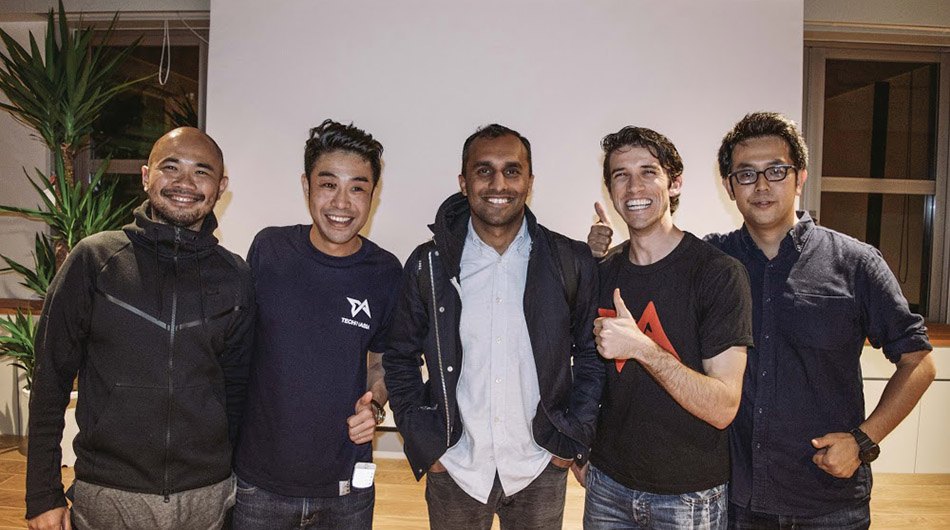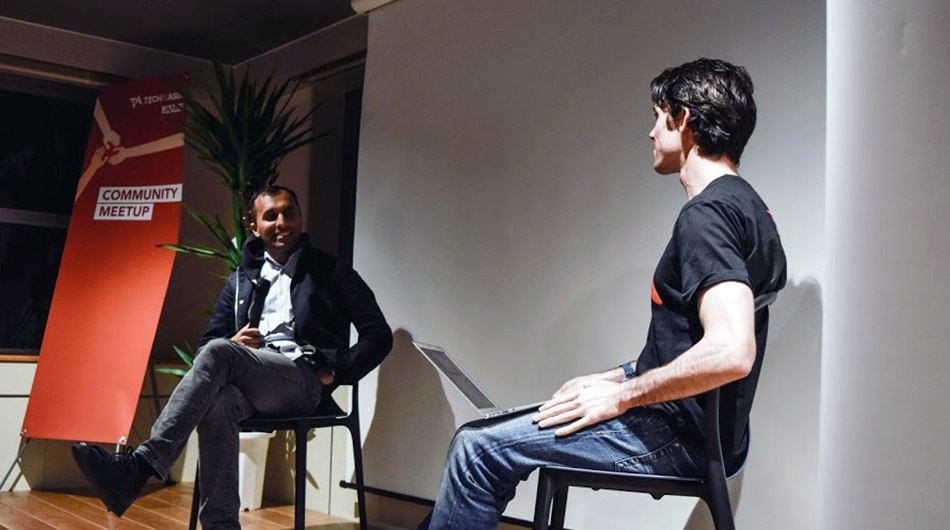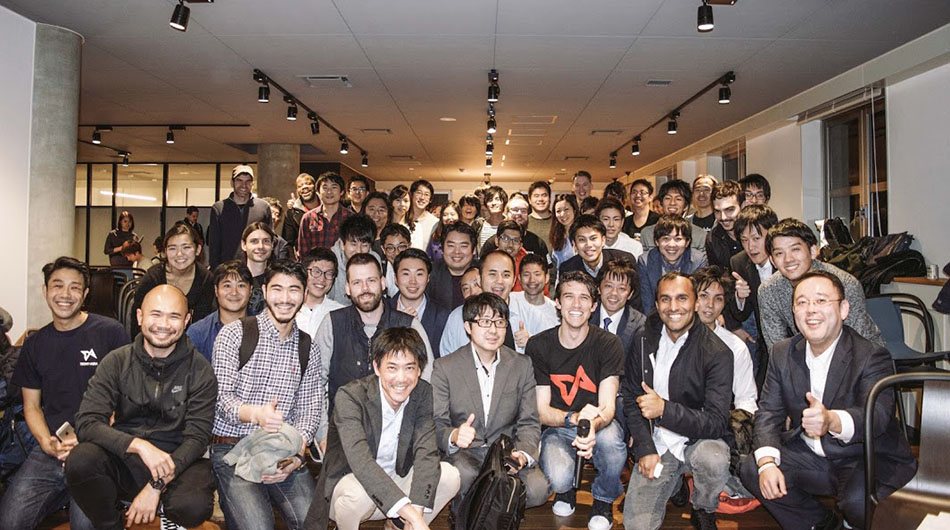
Qasar (center) with part of the Tech in Asia Japan team and East Ventures co-founder and managing partner Batara Eto (left).
Qasar Younis’ startup TalkBin was acquired by Google in 2011. His family moved from Pakistan to the United States in 1988. An engineer, Qasar left a career in the auto industry, packed all his things in a car, and moved to San Francisco on the advice of his mentor. He is proud of his Harvard MBA but returned to Y Combinator in 2014, this time not as a founder, but as COO.
Qasar has a lot of experiences. Tech in Asia’s community in Japan was treated to some special sushi last month when he shared his thoughts on growth and success that all early stage founders should know.
Talk to users
Talking to users is one of Y Combinator’s mantras. (Full disclosure: Tech in Asia is a graduate of Y Combinator.) While there isn’t a set rule, Qasar emphasizes that early stage companies with two to five employees should at least be talking to users weekly.
For example at TalkBin, Qasar conducted interviews at a local Starbucks with users solicited on Craigslist. He would tell people he worked for a marketing company and they were looking for feedback on an app to hide the fact he was the founder and get honest feedback.

Qasar and Peter Rothenberg from Tech in Asia at a community meetup.
In each 10-minute interview Qasar would show the website for a few seconds and then close the laptop and ask, “What do you think this company does?” If a user cannot explain it then you have to improve the product. Next you can try one or two more core things like signing up in the remaining time.
“The main point here is that you start with some hypothesis,” says Qasar. This type of unstructured feedback should be the main type until you have thousands, maybe even tens of thousands of users. Even during his time at Google, where his product had 500 million people using it daily, Qasar would do interviews. Ideally you are a user of your product as well so you can just think “What do I want?”
“What user testing forces you to do is to remember that most people who are using your product are using it for the first time,” he says.
What to focus on
Get the product out. Qasar believes that the longer you talk about an idea the more assumptions you might make, some of which could turn out to be completely wrong. “Assume you’re always wrong because then you’re more likely to listen to the market and be right.”
That’s the startup. It’s a drag out, week by week growth.
Founders should focus on only what can be measured, with the ultimate goal being profit. “We’re in the business of making businesses. If you can’t make profit immediately, then you should go for revenue.”
If you can’t get revenue you should go for recurring usage or move farther down the line to just usage, having a product, having a demo, having an idea, or having a team. The higher up you are on the ladder the better.
While some people may point out that companies like Facebook or Google didn’t make money for several years, business is really about the monetization of the demand for something. “There’s a number which represents demand that you can point towards, and it’s not more complicated than that,” says Qasar. “It’s just really, really hard to make numbers move consistently.”
Finding product-market fit
Many companies have mistakenly thought they found product-market fit and then wasted millions of dollars. Qasar thinks finding it is like love. Sometimes you just know.
“The company grows without your impact. Like you can go on vacation for a week and the company is bigger.” Qasar elaborates, “It’s not to take away from the founders… the founders are doing things in order to make the companies grow. But what is really happening is they have identified some fundamental demand and they are just channeling that demand.”
Qasar brings in another analogy of drilling for oil where there is some unknown quantity below the surface. You keep trying and in some places the oil comes up faster and in higher quality than others.
Grind it out
So how much should you be growing? Paul Graham wrote that if startups can hit 10 percent growth week over week, they are doing exceptionally well. But this is only a temporary state.
“Most founders think they just need a silver bullet and then they don’t have to focus on growth.” Qasar demonstrates this isn’t the case with a hypothetical food discovery app. At first you have zero users, so it’s easy to grow by asking friends to join, but eventually you run out of people around you.

“The whole point is not some grand plan of how am I going to get endless users; it’s about how am I going to make the numbers this week,” Qasar says. It is always a slow grind.
While there is no quick path to a million users, each thing you do can help lead you to larger pools of demand. With the food app example you might find events to be a good source of users, which makes you think of universities. You then visit all the schools in the area which keeps the team on track the next few weeks. While you’re doing that you think of tour groups or whatever. Things may stagnate but in general this approach will help you continuously move to larger groups of potential users.
“That’s the startup. It’s a drag out, week by week growth.”
There is no magical thing
Qasar points out that there is little difference between him and the audience and that founders know the most about their company. He articulates that mentors can tell you if you’re doing things wrong, but they can’t tell you how to do the right thing – which is getting users every week. “It’s fucking hard, and it’s fucking boring,” he laughs.
Expect failure and don’t give up if you fail on your initial idea. “That’s like saying your first relationship wasn’t a marriage? You should give up! This is it! You’re done.”
Luck and timing are important for success, but most importantly you should focus on making something people want.
Special thank you to East Ventures for the venue and Hiroki Kudo, CEO of Japanese accounting startup MerryBiz for translating!
This post https://www.techinasia.com/y-combinator-coo-qasar-younis-advice-growth-success appeared first on Tech in Asia.
from Tech in Asia https://www.techinasia.com/y-combinator-coo-qasar-younis-advice-growth-success
via IFTTT
No comments:
Post a Comment